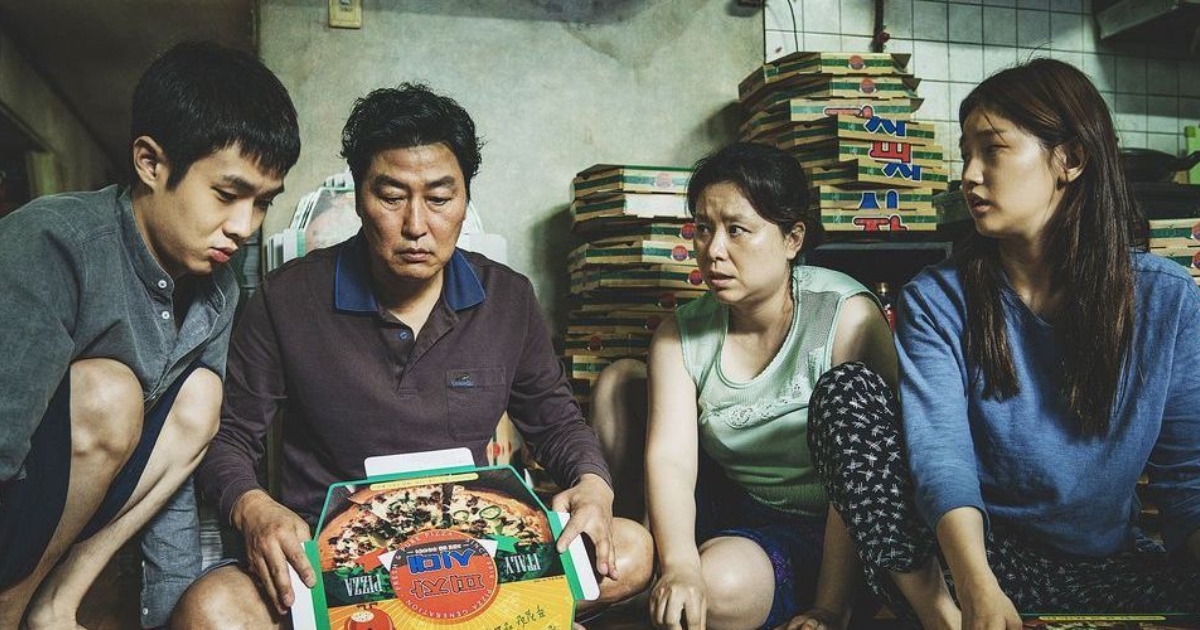
One would imagine that, following a run at a festival as prestigious as Cannes that saw it take home that very festival’s top prize, the buzz around a film like Bong Joon-ho’s Palme d’Or-winning Parasite would be rather vocal. However, being discussed as not only one of the year’s very best films but as one of the decade’s most exciting and impactful works, Parasite has seen a level of hype that most films could never truly live up to.
Then again, Parasite isn’t “most films.” Not in the slightest.
Bong Joon-ho’s intensely political follow-up to his equally as satirical Okja, Parasite introduces viewers to the Kim family. A group of down on their luck, street-wise hustlers, the Kim family are first seen absolutely in their element, as they rush about their cramped home in search of a Wi-Fi signal which they make a habit of stealing from nearby homes. An expert bit of economical storytelling, this sequence is ostensibly capped off by the patriarch noticing an oncoming fumigator which inspires him to open all the windows for a “free extermination.” It, like much of Parasite is on the nose to the point of near absurdism, but is also, like any good satire, utterly of a piece with not just the world created within the film but seemingly the logical extension of the one it’s satirizing.
Everything for the Kim family changes, though, after their son, Ki-woo, is invited to take on a tutoring gig for a well-to-do former friend. Despite not having anything resembling the “right stuff” for this gig, he, along with his sister Ki-jung (who helps forge documents for him) take the first step into the world of the Park family, a world that feels almost science-fiction in its sterility and wealth, made all the more arch by the absolute squalor the Kim family lives in. Slowly the two families merge through various cons played by the Kims, including things like Ki-jung posing as an art therapist for the increasingly troubled runt of the Park litter, Da-song. Ultimately culminating in a burst of violence that turns what’s otherwise been a class satire in the body of a (literal) upstairs/downstairs farce into a piercing bit of commentary, Parasite is an expertly made, endlessly entertaining political statement for the latest “eat the rich” generation.
Feeling very much in step with a film like Funny Games, Bong’s film is in keeping with that formally inventive and intellectually explosive film not only in its sharp tongue towards the .1% being attacked, but also the formal inventiveness with which the film is clearly basking in. Bong’s camera has always been a lively one, as seen not only in his previous film Okja, but the underwhelming yet endlessly thrilling Snowpiercer and even the film that more or less launched his career, his sophomore effort Memories of Murder. Where Bong does Haneke one better is in the fact that, despite being a carnival of grotesques for much of its admittedly too-long run time, it’s ceaselessly, uncompromisingly entertaining.
Entertaining in the same way the most captivating punk rock albums are, Bong’s direction is fully of verve and bite, a well and percussively-edited motion picture that takes its satire not only out of the narrative but production design as well. Quite literally placing classes on top of one another, the narrative takes turns that are both ambitious and decidedly fitting of this story, and the rich photography makes the lived in settings feel all the more otherworldly. This is a film about men, women and children trying to make ends meet in the same way the very best modern neo-realist films are, but seen through such a perverse prism that people screaming “buy me drugs” during a moment of sexual release feels both entirely true and brazenly biting.
But again, none of this is done with anything less that the keenest of eyes towards the sheer entertainment value film can offer. Sure, Parasite is a rich and often bald-faced satire that wears its themes on its bloodied sleeves, but it’s also a film that’s endlessly watchable. Each performance offers a new kink into the narrative and viewing experience, particularly the incredible Song Kang Ho, who as the patriarch of the Kim family, plays the role of sure-footed father with a confidence that shines like the sun despite his clear failings as anything close to a bread winner. It, like the majority of the film’s cast, is a performance that feels of a piece with the larger universe being skewered here, and despite being of some other Earth that’s just slightly more off its axis than this one we live on, plays with real heart.
Hirokazu Kore-eda’s 2018 masterpiece Shoplifters has often come into play when discussing this film as well, and as something of a comparison it’s apt. While Kore-eda is clearly set to mine the world of neo-realism laid in front of him by filmmakers generations before him, Bong takes this battle between classes and one family’s attempt to take that much craved-after next step up the economic ladder, and twists it into something of a fun house thrill ride. Twists are around, quite literally, every corner and while the film may be a pinch too long, it’s too breathlessly entertaining for one to care too much. Despite having a seemingly simplistic title and a level of hype that can come with some doubt, Parasite is a textured and knotty picture where the easy answer is never the one that’s right. It’s simply one of 2019’s most exciting and explosive motion pictures.



